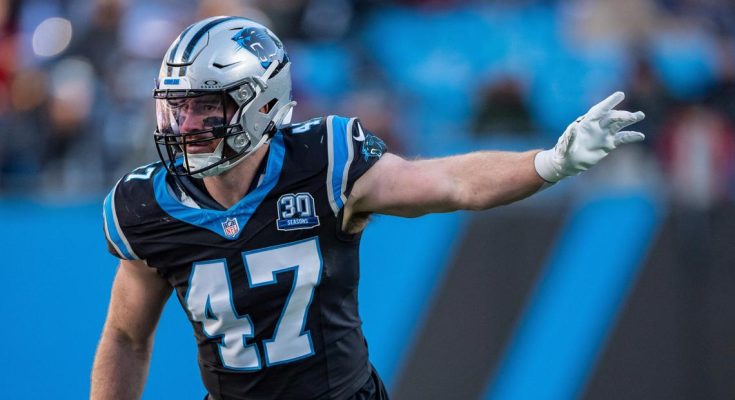The Carolina Panthers made a significant roster move on Tuesday, releasing veteran linebacker Josey Jewell after he continued to experience lingering concussion symptoms. The decision marks the end of Jewell’s brief tenure with the Panthers, raising questions about his future in the NFL and highlighting the ongoing concerns surrounding player health and safety, particularly when it comes to head injuries.
Josey Jewell, a seasoned linebacker with seven years of NFL experience, signed with the Panthers earlier this offseason after spending his entire career with the Denver Broncos. Known for his intelligence, toughness, and leadership on the field, Jewell was expected to bring stability and experience to Carolina’s young defense. However, his time with the team was cut short due to complications from a concussion suffered during offseason activities.
Concussions have long been a contentious issue in professional football, with the league implementing stricter protocols over the years to protect players. Despite these measures, some athletes continue to struggle with prolonged symptoms, forcing difficult decisions about their careers. Jewell’s release underscores the harsh reality that even talented players can be sidelined—or even forced into retirement—by health concerns.
The Panthers’ decision to part ways with Jewell was likely not made lightly. Teams must balance competitive needs with player welfare, and in this case, the uncertainty surrounding Jewell’s recovery timeline made it impractical to keep him on the roster. NFL teams operate under strict salary cap constraints, and carrying an injured player who may not contribute in the near future is often not feasible. Additionally, the Panthers may have wanted to give Jewell the opportunity to focus solely on his health without the pressure of returning to the field before he’s ready.
For Jewell, this development is undoubtedly disappointing. After establishing himself as a reliable starter in Denver, he likely saw his move to Carolina as a chance to continue making an impact. Instead, his season—and possibly his career—has been thrown into uncertainty. Concussion symptoms can vary widely from player to player, with some recovering quickly while others face months or even years of complications. Given the severity of his situation, Jewell may now have to consider whether continuing to play is worth the risk to his long-term health.
The broader implications of Jewell’s release extend beyond just one player. It serves as another reminder of the physical toll football takes on its athletes, particularly when it comes to head trauma. The NFL has made strides in improving concussion protocols, but cases like Jewell’s demonstrate that more work may be needed. Teams, players, and medical staff must continue to prioritize health over short-term gains, even if it means making tough roster decisions.
From a football perspective, the Panthers now face the challenge of replacing Jewell’s expected production. He was projected to be a key piece in their linebacker rotation, bringing veteran savvy to a unit that includes younger players like Shaq Thompson and recent draft picks. Carolina may now turn to free agency or internal options to fill the void, but finding someone with Jewell’s experience and skill set won’t be easy.
As for Jewell’s future, much will depend on his recovery. If his symptoms subside, another team could take a chance on him later in the season. However, if his health issues persist, retirement may become a real consideration. Many players before him have faced similar crossroads, weighing their love for the game against the risks of further injury.
Ultimately, Josey Jewell’s release is a sobering moment for the NFL. It’s a reminder of the fragility of a player’s career and the importance of health above all else. While fans and teams focus on wins and losses, stories like this bring the human element of the sport back into focus. Whether Jewell returns to the field or not, his situation highlights the need for continued progress in player safety and support for those dealing with the aftermath of injuries.
The Panthers will move forward, adjusting their roster as needed, but the hope remains that Jewell can recover fully and make the best decision for his long-term well-being. In a league where physicality is celebrated, it’s crucial to remember that the players behind the helmets are more than just athletes—they’re individuals with lives and futures that extend far beyond the game.



